新课标高中英语必修一unit4学案
学案必修一unit4
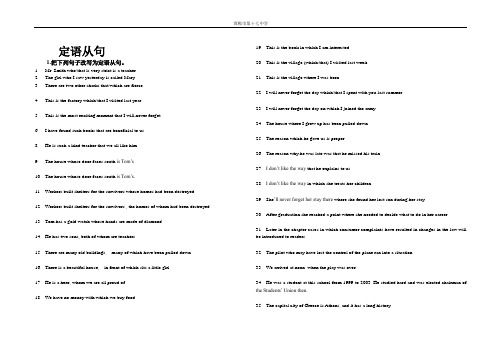
定语从句1.把下列句子改写为定语从句。
1. Mr. Smith who/that is very strict is a teacher2. The girl who I saw yesterday is called Mary.3. There are two other sharks that/which are fierce.4. This is the factory which/that I visited last year.5. This is the most exciting moment that I will never forget.6. I have found such books that are beneficial to us.8. He is such a kind teacher that we all like him.9. The house whose door faces south is Tom’s.10. The house whose door faces south is Tom’s.11. Workers built shelters for the survivors whose homes had been destroyed.12. Workers built shelters for the survivors , the homes of whom had been destroyed.13. Tom has a gold watch whose hands are made of diamond.14. He has two sons, both of whom are teachers.15. There are many old buildings, many of which have been pulled down.16. There is a beautiful house, in front of which sits a little girl.17. He is a hero, whom we are all proud of .18. We have no money with which we buy food. 19. This is the book in which I am interested.20. This is the village (which/that) I visited last week.21. This is the village where I was born.22. I will never forget the day which/that I spent with you last summer.23. I will never forget the day on which I joined the army.24. The house where I grow up has been pulled down.25. The reason which he gave us is proper.26. The reason why he was late was that he missed his train.27. I don’t like the way that he explains to us.28. I don’t like the way in which she treats her children.29. She’ll never forget her stay there where she found her lost son during her stay.30. After graduation she reached a point where she needed to decide what to do in her career.31. Later in the chapter cases in which consumer complaints have resulted in changes in the law will be introduced to readers..32. The pilot who may have lost the control of the plane ran into a situation.33. We arrived at noon. when the play was over.34. He was a student at this school from 1999 to 2003. He studied hard and was elected chairman of the Students’ Union then.35. The capital city of Greece is Athens, and it has a long history.36. He was killed on Oct., 1949, and on that day he joined the Party.37. He completed college at 15, and I could hardly believe it.38. He failed the exam again. We had expected it.39. He is one of the students. They are often late for school.40. He is the only one of the students. He was often late for school. 把下面两个简单句合并成定语从句1.The eggs were not fresh. I bought them yesterday.2.The friend was not hungry. He came to supper last night.3.He prefers the cheese. It comes from his parent’s farm.4.The noodles were delicious. You cooked them.5.I don’t like the people. They smoke a lot.1.The place _______interested me most was the Children's Palace.A. whichB. whereC. whatD. in which2.Do you know the man _______?A. whom I spokeB. to who spokeC. I spoke toD. that I spoke3.This is the hotel _______last month.A. which they stayedB. at that they stayedC. where they stayed atD. where they stayed 4.Do you know the year ______the Chinese Communist Party was founded?A. whichB. thatC. whenD. on which5.That is the day ______I'll never forget.A. whichB. on whichC. in whichD. when6.The factory ______we'll visit next week is not far from here.A. whereB. to whichC. whichD. in which7.Great changes have taken place since then in the factory _______we are working.A. whereB. thatC. whichD. there8.This is one of the best films _______.A. that have been shown this yearB. that have shownC. that has been shown this yearD. that you talked9.Can you lend me the book ______the other day?A. about which you talkedB. which you talkedC. about that you talkedD. that you talked10.The pen ______he is writing is mine.A. with whichB. in whichC. on whichD. by which。
人教新课标必修一 Unit 4 Earthquakes学案
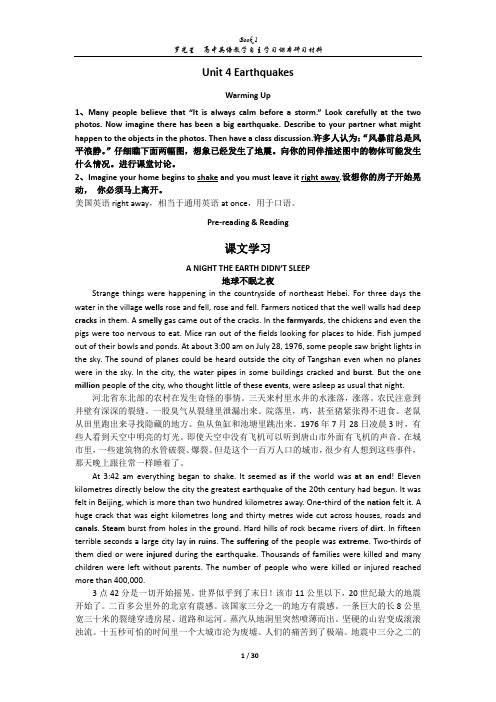
Unit 4 EarthquakesWarming Up1、Many people believe that “It is always calm before a storm.” Look carefully at the two photos. Now imagine there has been a big earthquake. Describe to your partner what might happen to the objects in the photos. Then have a class discussion.许多人认为:“风暴前总是风平浪静。
”仔细瞧下面两幅图,想象已经发生了地震。
向你的同伴描述图中的物体可能发生什么情况。
进行课堂讨论。
2、Imagine your home begins to shake and you must leave it right away.设想你的房子开始晃动,你必须马上离开。
美国英语right away,相当于通用英语at once,用于口语。
Pre-reading & Reading课文学习A NIGHT THE EARTH DIDN’T SLEEP地球不眠之夜Strange things were happening in the countryside of northeast Hebei. For three days the water in the village wells rose and fell, rose and fell. Farmers noticed that the well walls had deep cracks in them. A smelly gas came out of the cracks. In the farmyards, the chickens and even the pigs were too nervous to eat. Mice ran out of the fields looking for places to hide. Fish jumped out of their bowls and ponds. At about 3:00 am on July 28, 1976, some people saw bright lights in the sky. The sound of planes could be heard outside the city of Tangshan even when no planes were in the sky. In the city, the water pipes in some buildings cracked and burst. But the one million people of the city, who thought little of these events, were asleep as usual that night.河北省东北部的农村在发生奇怪的事情。
人教版新课标高一英语必修一第四单元教学设计
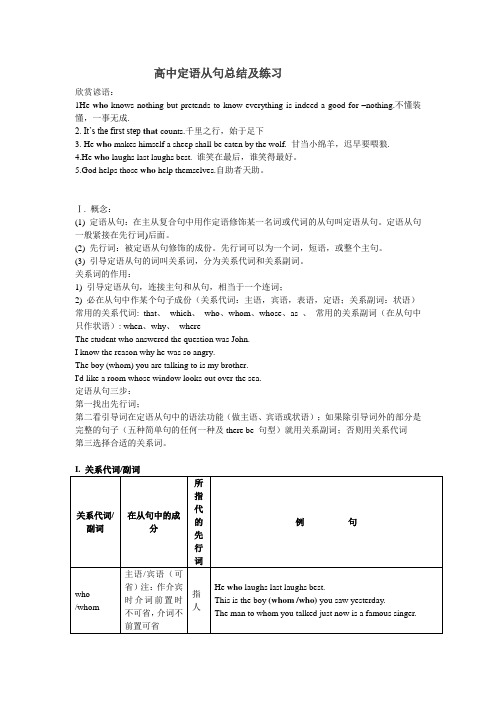
高中定语从句总结及练习欣赏谚语:1He who knows nothing but pretends to know everything is indeed a good-for –nothing.不懂装懂,一事无成.2. It’s the first step that counts.千里之行,始于足下3. He who makes himself a sheep shall be eaten by the wolf. 甘当小绵羊,迟早要喂狼.4.He who laughs last laughs best. 谁笑在最后,谁笑得最好。
5.God helps those who help themselves.自助者天助。
Ⅰ. 概念:(1) 定语从句:在主从复合句中用作定语修饰某一名词或代词的从句叫定语从句。
定语从句一般紧接在先行词)后面。
(2) 先行词:被定语从句修饰的成份。
先行词可以为一个词,短语,或整个主句。
(3) 引导定语从句的词叫关系词,分为关系代词和关系副词。
关系词的作用:1) 引导定语从句,连接主句和从句,相当于一个连词;2) 必在从句中作某个句子成份(关系代词:主语,宾语,表语,定语;关系副词:状语)常用的关系代词: that、which、who、whom、whose、as 、常用的关系副词(在从句中只作状语): when、why、whereThe student who answered the question was John.I know the reason why he was so angry.The boy (whom) you are talking to is my brother.I'd like a room whose window looks out over the sea.定语从句三步:第一找出先行词;第二看引导词在定语从句中的语法功能(做主语、宾语或状语);如果除引导词外的部分是完整的句子(五种简单句的任何一种及there be 句型)就用关系副词;否则用关系代词第三选择合适的关系词。
新课标高中英语必修一unit4学案

Unit 4 Earthquake1、shake v.&n.①v t.&vi.(shook, shaken) 摇动;震动;颤抖;shake hands with sb /shake sb’ s hand / shake sb. by the hand 与…握手shake one’ s head at sb 朝某人摇头(表否定, 怀疑, 悲伤, 不赞成等)shake with…. 因…..而颤抖e.g.: a. shake with laughter, fear, rage, etc 笑得, 吓得, 气得……打颤b. shake with cold 冻得发抖shake one’ s fist at sb 向某人挥拳表示愤怒或恐吓.e.g.: a. shake the bottle before using. 使用之前请摇动瓶子.b. The earthquake shook the building. 地震使房子振动.②n. [ c ] (多用单数) 摇动; 震动;e.g.: a shale pf the head 摇头辨析: shake, tremble ,quake①shake 为常用词, 表示短促而迅速地上下往来摇动.②tremble 尤指身体因恐惧、激动或愤怒轻微、快速、不由自主地颤抖.e.g.: tremble with rage, excitement etctrembling hands 颤抖的手③quake 较为正式, 常同tremble ,但含“猛烈”的意思.e.g.: quake with fear/cold 因恐惧[寒冷]而颤抖.△quake n. (口) == earthquake练习: The boy shook his mother’s hand.→The boy shook hand.2、right away == at once / without delay. 毫不耽搁地;不可用于进行时态.e.g.: I’ll write to him right away.right now == immediately / in no time / in a moment / at this very moment / at present 立刻;在此时;在此刻. 在作“在此时”, “在此刻”讲时,可用于进行时态.e.g.: He’s writing a novel right now.2、rise vi. (rose; risen)①(太阳, 月亮, 星星等)升起;出现; == go up / come up 反义→set②(物价, 东西等)上涨;上升; == go up / increase(vi.) 反义→go down / fall / droprise to 上升到; rise by 上升了;③(人等)站起来,起床,起身. rise to one’s feet == stand up 站起来raise sb to one’s feet 把某人扶起来early to bed and early to rise 早睡早起n. 升起;升高;增加=increasegive rise to sth 引起;导致; == cause sth / lead to / result in / bring about sthgive sb a rise 给某人涨工资;提职;the rise and fall of the British Empire 大英帝国的兴衰e.g.: a. The Sun rises in the east and sets in the west.b. Prices have risen steadily during the past decade.c. The rise in the house rent has added to our difficulties.d. He rose from the chair.辨析: rise, raise,arise①rise vi. 升起;上升;增长;升高. 说明主语自身移向较高位置.(自然上升/升起)e.g.: The temperature is still rising.②raise vt 举起;提起;抬高. 说明主语发出的动作是要作用于其他事物的(人为的举起;抬起;提高),另:还可意为”提出;饲养;种植”.e.g.: Let’s raise glass to our friendship.raise a family 养家;抚养子女; raise…to 举例…;提高到…raise…by 举高了…;提高了….③arise vi. 出现,发生,产生(arose, arisen)=appeare.g.: A new difficulty has arisen.increase& improve①increase == become or make sth larger in number or amount.(v.&n.) 增加(大).(数目或数量)increase (v.) to 增加到by 增加了on the increase(n.) == increasing 正在增加. == on the risee.g.: The rate of inflation has increased by 2﹪. 通货膨胀率已增长了2﹪.②improve vt. &vi. 改良;改进;改善;(make sth become better)e.g.: His health is improving. 他的健康正在好转.improvement n. 改善,提高练习: After the operation, the player has done more exercise to ___C___ his strength.A. riseB. improveC. increaseD. raise4、ruin①n. 毁灭,崩溃;遗迹,废墟;(常用算数)be in ruins 呈一片废墟fall into ruins 变成废墟bring sth to ruin 使毁灭come to ruin 毁灭,落空go to ruin 毁坏;毁灭ruin one self 自我毁灭②vt.毁灭;毁坏,使破产;sth ruin sthe.g.: The fire ruined the books in the library.辨析: ruin, destroy, damage.① ruin 一般指对物体或生命彻底的破坏,但往往是非暴力的,也往往指不是一次的打击结果,常指对美好的希望中的事物的破坏.[强调彻底毁坏,往往是长期性的并非一次性行为,不能修复.] ②destroy 表示在肉体上、精神上或道义上的彻底摧毁,使之无法复原,也可表示对某物体进行完全的毁坏.[指通过某种特有的或粗暴的手段使之毁灭或无用,一般很难修复.]③damage 损失;损坏;多用于无生命的东西,指“价值、用途降低或外表损坏等,不一定全部破坏,损坏了可以修复”;这种损失是自然灾害或人为过失造成的.练习: (用ruin, damage, destroy 的正确形式填空.)1.The fire destroyed most of the building.2.The crops are all ruined by the continuous rain.3. A falling tree damaged the roof and we should repair it.5、injure vt. 使受伤;损害;伤害感情;e.g.: a. Smoking will injure your health.b. The boy injured his leg.c. Your remark may injure her pride (自尊).injure n. [c] 伤;伤口;伤害. injured adj. 受伤的.the injured (在事故,战斗等中)受伤的== the wounded.辨析: hurt, injure, wound, harm.①hurt “受伤”的一般用语,既可指肉体上的伤害也可指精神上的伤害. e.g.: hurt one’s feelings②injure 一般指由于意外或事故而受伤,精神上的结果的伤害多用hurt.③wound 指外伤,如刀伤,枪伤,剑伤,尤指在战争中受伤.④harm 常用于口语,一般只作及物动词,特指伤及一个或其心情、健康、权利、事业等,并使之产生痛苦、损害或某种不幸遭遇.练习: (用wound, damage, destroy, harm, hurt, injure 的适当形式填空.)1. She felt hurt at your words.2. Don’t harm your eyes by reading in dim light.3. The bullet wounded him in the shoulder.4. The bus was badly damaged when it hit the wall.5. The building was destroyed in the earthquake.6. He was injured in the accident.6、shock vt.&vi (使)震惊; (使)震动;== astonish / surprise / amaze(令惊叹,佩服之意) /wonder=surprise greatlybe shocked at (doing) sth 因…….而震惊.be shocked to doe.g.: a. I was shocked at the news of her death..b. He was shocked (at knowing his son playing all day. / to know his son playing all day.)n. 冲击;震动;打击;突击、休克;电击;go into / be in shock 处于休克状态get a shock from a wire 碰着电线而触电e.g.: a. An electric shock can kill you .b. It was a great shock for him when his wife died.adj. shocking 令人震惊的;shocked 感到震惊的7、rescue v.&n.e.g.: a. rescue a man from drowning ,attack.. 援救一男子使之免遭溺毙,攻击.b. rescue sb from danger. 营救某脱离危险.c. you rescued me from an embarrassing situation. 是你给我解了围.②n. 搭救;解救;come /go to the /sb’ s rescue 援救或帮助某人.a rescue party 抢救队rescue workers 救援人员辨析: rescue, save①rescue 求助,援助,营救,重在强调迅速行动,从直接的和迫在眉捷的危险中解救.②save 救;救助;拯救,普通用词,使用广泛,常指把处于危险或危急状态的人或事物救出来使之得以保全,很多情况下两词可以换用.8、judge v.&n.①vt. 审判;断定;评价;认为. (不用于被动语态)Sb / sth (to be) + n./adje.g.: I judged him to be about 50. 断定某人/某物……that – clause / whether….Judge e.g.: He judged that it was time to open the proceedings. 他认为是开始的时候了.it + n./adj. + to do sth 认为干某事是……e.g.: The committee judged it advisable to postpone the meeting. (委员会认为会议应该延期举办).sth by / from 根据……判断e.g.: Don’t judge by appearances. 不要以貌取人.Judging from 从….判断(一般不用judged)拓展:英语中常用来作评价性的词句的非谓语动词(短语),与句子的实际主语之间不存在主动或被动的逻辑关系,常见的有:judging from/by, considering, supposing, to tell you the truth, to be honest, generally /frankly/properly/honestly speaking.②n. [c] 裁判;法官;judgmentpass a judgment on…对…作出评价.in one’s judgment 照某人看来. s opinion/to one’s thinking.use/exercise one’s judge 运用判断力.9、a (great / large) number / (great / large) numbers of许多;大量; + n.(pl).作主语时,句子谓语用复数the number of + n.(pl). 意为”…的数量”,作主语时,句子谓语用单数.a large/great/good/big number oflarge/great/good numbers of + n.(pl). 谓语用复数a good/great many (of the)many (of the)many a + n (单) 谓语用单数large amounts of + n.[u] 谓语用复数e.g.: Large amounts of money were spent on the bridge.a large/great amount of + n.[u] 谓语用单数a great deal of + n.[u] 谓语用单数a lot of n.[u] 谓语用单数+lots of n.[pl] 谓语用复数e.g.: There was lots of money in the safe.plenty of + n.[u] 谓语用复数n.[pl] 谓语用单数a quantity of + n,[pl] 谓语用复数n.[u] 谓语用单数quantities of + n.[pl] 谓语用复数n.[u]much (of the) + n.[u] 谓语用单数10、bury vt.①埋葬; e.g.: He was buried with his wife.②将某人/物藏于地下;隐藏; e.g.: Our dog buries it’s bones in the garden.③覆盖;遮盖; e.g.: She buried her face in her hands and wept.④从记忆中除去;忘记== forget e.g.: It’s time to bury our differences and be friends again.bury oneself in sth 埋头于某事物;专心致志于某事物. == involve oneself in/ concentrate on/ focus one’s mind/attention on/ fix one’s mind/attention on/ keep one’s mind on/ devote oneself to / be deep in sth /be absorbed inbe buried in thoughts/memories of the past=be deep in thought拓展:被动形式表主动意义的类似结构:be hidden among the woods 躲在树林里be lost in deep thought 陷入沉思be seated in an armchair 坐在椅子上be stationed in the village 驻扎在村里be dressed in red clothes 穿着红色的衣服be compared to/with 与…相比be drunk 喝醉be devoted to education 献身教育be set in 以….为背景be situated/located in 座落在be involved in 被卷入….11、honour v.&n.①. v. 尊敬,给予荣誉,表扬某人honour sb/sth with sth =sb. be honoured with 因某事使某人感到荣幸;给某人以荣誉honour sb for sth =sb be honoured for 因某事表彰某人honour sb as =sb be honoured as 尊某人为…e.g.: a.Will you honour me with a visit? 如蒙造访则荣幸之至。
必修一英语四单元教学设计
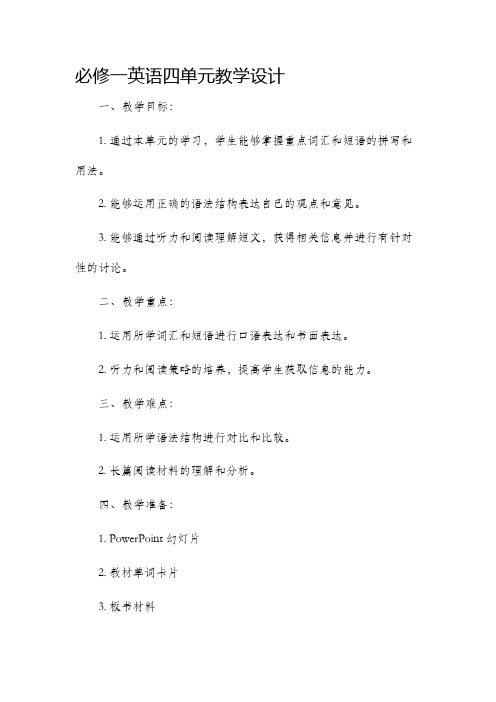
必修一英语四单元教学设计一、教学目标:1. 通过本单元的学习,学生能够掌握重点词汇和短语的拼写和用法。
2. 能够运用正确的语法结构表达自己的观点和意见。
3. 能够通过听力和阅读理解短文,获得相关信息并进行有针对性的讨论。
二、教学重点:1. 运用所学词汇和短语进行口语表达和书面表达。
2. 听力和阅读策略的培养,提高学生获取信息的能力。
三、教学难点:1. 运用所学语法结构进行对比和比较。
2. 长篇阅读材料的理解和分析。
四、教学准备:1. PowerPoint幻灯片2. 教材单词卡片3. 板书材料五、教学过程:Step 1:导入新单词 (10分钟)1. 讲解新单词和短语,并使用图片和实物进行说明。
2. 学生进行跟读练习,并运用所学词汇进行句子造句。
Step 2:听力训练 (15分钟)1. 播放录音,让学生根据听到的内容选择正确的答案。
2. 听完录音后,进行听力答案核对和讲解。
Step 3:阅读训练 (20分钟)1. 学生阅读教材中给出的短文,完成相关的阅读理解题目。
2. 学生之间互相讨论,核对答案,并给出自己的理由和观点。
Step 4:语法讲解和练习 (15分钟)1. 通过示例句子引导学生发现并总结本文所学语法结构的用法。
2. 分组讨论和展示,运用所学语法结构进行口语练习。
Step 5:口语训练 (25分钟)1. 分组讨论一个话题,如“你的理想职业是什么?”,并用所学语法结构进行讨论表达。
2. 分组之间进行互相提问和回答,鼓励学生用所学句型进行交流。
Step 6:总结和巩固 (10分钟)1. 学生进行小结,总结本单元所学的重点知识和语法结构。
2. 教师给予肯定和提醒,巩固学生对所学内容的记忆。
六、课后作业:1. 完成教材中的课后练习题。
2. 写一篇短文,介绍你的理想职业,使用本单元所学的词汇和语法结构。
七、教学反思:本节课设计了多样化的教学活动,从听力、阅读、语法到口语训练,充分利用了多种教学方法。
通过听力和阅读训练,培养学生获取信息的能力;通过语法讲解和口语训练,提高学生运用所学知识进行表达的能力。
Unit4 教学设计 高中英语人教版必修第一册

必修一Unit4 Reading and Thinking【Teaching Objectives:】1.Enable students to understand the causes and consequences of the Tangshan earthquake.2.Develop students' reading comprehension skills, such as skimming, scanning, and inferencing.3.Cultivate empathy and awareness about the impact of natural disasters on communities.4.Encourage critical thinking and discussions about resilience and rebuilding aftera disaster.【Teaching Key and Difficult Points】Key Point: Understanding the timeline and events of the Tangshan earthquake.Identifying the actions taken to rebuild Tangshan and support its inhabitants.Difficult Point: Discussing the emotional and social impact of natural disasters on communities.【Teaching Procedure:】Step1. Warm-upBegin the lesson by asking students if they have ever experienced or heard about any natural disasters in their region or other parts of the world. Encourage them to share their experiences or what they know about these events.Step2. Pre-ReadingAnticipation Guide Prepare an anticipation guide with statements related to earthquakes, disasters, and resilience. Have students respond to the statements before reading the article. Sample statements:"Earthquakes only affect the region where they occur.""Rebuilding after a disaster is an impossible task.""People's unity is essential in overcoming a disaster."After the article is read, revisit the statements to discuss whether their opinions have changed.Step3. While-ReadingActivity 1: Visualizing the SceneDisplay a picture of the Tangshan earthquake aftermath, and ask students to describe what they see. Prompt them to visualize the impact and destruction caused by the earthquake.Activity 2: Comprehension QuestionsDivide the class into groups and provide each group with a set of comprehension questions related to the article. Example questions:What time did the earthquake occur?How many people were estimated to be dead or injured?How did the government and volunteers help Tangshan recover? Encourage students to refer back to the article for answers and discuss their responses within their groups.Activity 3: Cause and EffectHave students identify the causes and effects of the Tangshan earthquake. Discuss as a class how natural disasters can have far-reaching consequences and how communities respond in the aftermath.Step4. Post-ReadingActivity 1: Survivor StoriesAsk students to imagine they were survivors of the Tangshan earthquake. In small groups, they can create short narratives from the perspective of different individuals who experienced the disaster. Encourage creativity and empathy in their storytelling.Activity 2: Disaster PreparednessPoster Divide the class into teams and assign each team a specific natural disaster (e.g., earthquake, flood, hurricane). Have the teams create informative posters that highlight safety tips and preparation measures for that particular disaster.HomeworkAsk students to research and write a short essay on a different natural disaster that occurred in a different part of the world, discussing its impact on the community and how people responded to rebuild and recover.。
最新高中英语人教新课标必修1 精品教学设计Unit4
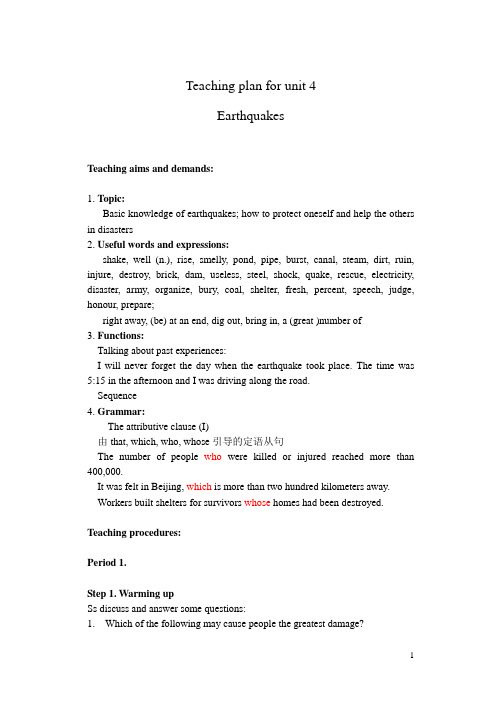
Teaching plan for unit 4EarthquakesTeaching aims and demands:1. Topic:Basic knowledge of earthquakes; how to protect oneself and help the others in disasters2. Useful words and expressions:shake, well (n.), rise, smelly, pond, pipe, burst, canal, steam, dirt, ruin, injure, destroy, brick, dam, useless, steel, shock, quake, rescue, electricity, disaster, army, organize, bury, coal, shelter, fresh, percent, speech, judge, honour, prepare;right away, (be) at an end, dig out, bring in, a (great )number of3. Functions:Talking about past experiences:I will never forget the day when the earthquake took place. The time was 5:15 in the afternoon and I was driving along the road.Sequence4. Grammar:The attributive clause (I)由that, which, who, whose引导的定语从句The number of people who were killed or injured reached more than 400,000.It was felt in Beijing, which is more than two hundred kilometers away. Workers built shelters for survivors whose homes had been destroyed.Teaching procedures:Period 1.Step 1. Warming upSs discuss and answer some questions:1. Which of the following may cause people the greatest damage?A. earthquakeB. typhoonC. floodD. drought2.Imagine your home begins to shake and you must leave it right away. You have time to take only one thing. What will you take? Why?Step 2. Pre-readingSs discuss and answer:1.Do you know what would happen before an earthquake?2.What can we do to keep ourselves safe from an earthquake?3. Do you know anything about Tangshan Earthquake in 1976?Step 3. Reading1.Skimming and find the answers to the following questions:a.What happened?b.When and where did it happen?3.Ss read the whole passage again and get the main ideas of each part:Part 1. The natural signs of a coming earthquakePart 2. The damage of the city after the earthquakePart 3. The help to the survivorsStep 4. ComprehendingSs finish Ex 1 and 2 on page 27.。
高一英语(必修一)_Unit_4学案
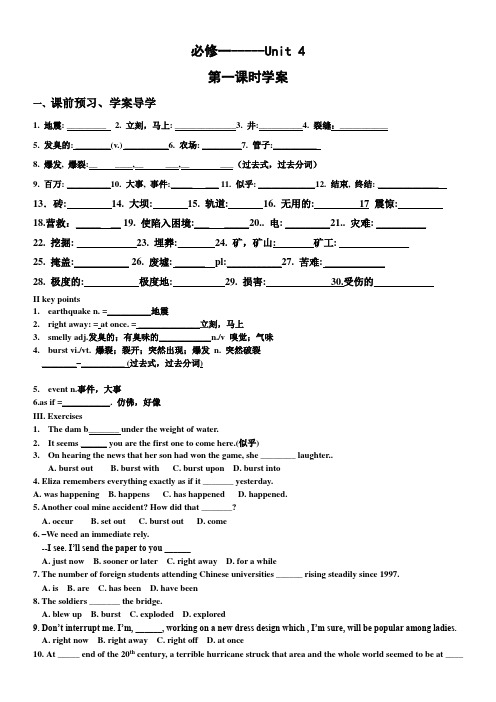
必修一-----Unit 4第一课时学案一、课前预习、学案导学1. 地震: _________2. 立刻,马上: ______________3. 井:__________4. 裂缝:___________5. 发臭的: ________(v.) __________6. 农场: _________7. 管子:__________8. 爆发, 爆裂:__ ____,__ ___,__ ___(过去式,过去分词)9. 百万: __________10. 大事, 事件:_____ ___ 11. 似乎: _____________12. 结束, 终结: ______________ 13.砖: ______14. 大坝: ______ 15. 轨道:__ ____ 16. 无用的:____ __17 震惊:________ 18.营救:_____ __ 19. 使陷入困境:___ _____20.. 电: _________21.. 灾难: __________22. 挖掘: ____________23. 埋葬:_______ 24. 矿,矿山: _______矿工: ______________25. 掩盖:___________ 26. 废墟: ______ pl:___________27. 苦难: ____________28. 极度的:___________极度地: __________29. 损害:_____________30.受伤的____________II key points1.earthquake n. =__________地震2.right away: = at once. = ______________立刻,马上3.smelly adj.发臭的;有臭味的____________n./v 嗅觉;气味4.burst vi./vt. 爆裂;裂开;突然出现;爆发n. 突然破裂________–__________ (过去式,过去分词)5.event n.事件,大事6.as if =___________. 仿佛,好像III. Exercises1.The dam b_______ under the weight of water.2.It seems ______ you are the first one to come here.(似乎)3.On hearing the news that her son had won the game, she ________ laughter..A. burst outB. burst withC. burst uponD. burst into4. Eliza remembers everything exactly as if it _______ yesterday.A. was happeningB. happensC. has happenedD. happened.5. Another coal mine accident? How did that _______?A. occurB. set outC. burst outD. come6. –We need an immediate rely.--I see. I’ll send the paper to you ______A. just nowB. sooner or laterC. right awayD. for a while7. The number of foreign students attending Chinese universities ______ rising steadily since 1997.A. isB. areC. has beenD. have been8. The soldiers _______ the bridge.A. blew upB. burstC. explodedD. explored9. Don’t interrupt me. I’m, ______, working on a new dress design which , I’m sure, will be popular among ladies.A. right nowB. right awayC. right offD. at onceend.A. an; theB. the; anC. the; theD. an; an必修一-----Unit 4第二课时学案学习目标:掌握本单元的重点单词学习重点:重点词汇的基本用法学习难点:重点单词的拓展用法学习过程一、自主学习(一)边学习边完成下列问题I words and expressions1. 国家: _______ 民族的:________ 国籍: ___________2. 运河: ________3. 污垢: _______污垢的: ________4. 蒸汽: _________5. 废墟: ______ pl:___________6. 苦难: ____________7. 极度的:___________极度地: __________8. 损害:_____________受伤的____________II Key points1. nation民族;国家_______adj. 民族的;国家的_________n 国籍2 . dirt n. 污垢;泥土________adj. 污垢的3. ruin n. (U.) 毁坏,毁灭,崩溃(C.)废墟,遗迹短语:in ruins 成为废墟ruin one’s health/ fame 毁掉某人的健康/ 名誉4. suffering n. 苦难;痛苦__________v. 遭受5. extreme adj. 极度的___________adv. = in the extreme6. injure vt. 损伤;伤害_________adj. 受伤的_______n.损伤,伤害短语:do an injury to sb. 伤害某人the injured 伤员injure one’s pride/ feelings 伤害某人的自尊/ 情感Eg. He was badly__________ in the accident.She refused injuring his pride.This could seriously ______the company’s reputation(名誉). ( 伤害)The injured ______sent to hospital right away.(be)7. survivor n. 幸存者;生还者__________vt./vi. 幸存,生还8. destroy vt.摧毁_________________n. 毁坏Eg. The building was ____________by fire.比较:destroy , ruin , damage.destroy 常指彻底的,不能或很难修复的“破坏”,程度较深;也可用于损坏抽象的东西,比如名誉,计划,努力,契约等。
- 1、下载文档前请自行甄别文档内容的完整性,平台不提供额外的编辑、内容补充、找答案等附加服务。
- 2、"仅部分预览"的文档,不可在线预览部分如存在完整性等问题,可反馈申请退款(可完整预览的文档不适用该条件!)。
- 3、如文档侵犯您的权益,请联系客服反馈,我们会尽快为您处理(人工客服工作时间:9:00-18:30)。
Unit 4 Earthquake1、shake v.&n.①v t.&vi.(shook, shaken) 摇动;震动;颤抖;shake hands with sb /shake sb’ s hand / shake sb. by the hand 与…握手shake one’ s head at sb 朝某人摇头(表否定, 怀疑, 悲伤, 不赞成等)shake with…. 因…..而颤抖e.g.: a. shake with laughter, fear, rage, etc 笑得, 吓得, 气得……打颤b. shake with cold 冻得发抖shake one’ s fist at sb 向某人挥拳表示愤怒或恐吓.e.g.: a. shake the bottle before using. 使用之前请摇动瓶子.b. The earthquake shook the building. 地震使房子振动.②n. [ c ] (多用单数) 摇动; 震动;e.g.: a shale pf the head 摇头辨析: shake, tremble ,quake①shake 为常用词, 表示短促而迅速地上下往来摇动.②tremble 尤指身体因恐惧、激动或愤怒轻微、快速、不由自主地颤抖.e.g.: tremble with rage, excitement etctrembling hands 颤抖的手③quake 较为正式, 常同tremble ,但含“猛烈”的意思.e.g.: quake with fear/cold 因恐惧[寒冷]而颤抖.△quake n. (口) == earthquake练习: The boy shook his mother’s hand.→The boy shook hand.2、right away == at once / without delay. 毫不耽搁地;不可用于进行时态.e.g.: I’ll write to him right away.right now == immediately / in no time / in a moment / at this very moment / at present 立刻;在此时;在此刻. 在作“在此时”, “在此刻”讲时,可用于进行时态.e.g.: He’s writing a novel right now.2、rise vi. (rose; risen)①(太阳, 月亮, 星星等)升起;出现; == go up / come up 反义→set②(物价, 东西等)上涨;上升; == go up / increase(vi.) 反义→go down / fall / droprise to 上升到; rise by 上升了;③(人等)站起来,起床,起身. rise to one’s feet == stand up 站起来raise sb to one’s feet 把某人扶起来early to bed and early to rise 早睡早起n. 升起;升高;增加=increasegive rise to sth 引起;导致; == cause sth / lead to / result in / bring about sthgive sb a rise 给某人涨工资;提职;the rise and fall of the British Empire 大英帝国的兴衰e.g.: a. The Sun rises in the east and sets in the west.b. Prices have risen steadily during the past decade.c. The rise in the house rent has added to our difficulties.d. He rose from the chair.辨析: rise, raise,arise①rise vi. 升起;上升;增长;升高. 说明主语自身移向较高位置.(自然上升/升起)e.g.: The temperature is still rising.②raise vt 举起;提起;抬高. 说明主语发出的动作是要作用于其他事物的(人为的举起;抬起;提高),另:还可意为”提出;饲养;种植”.e.g.: Let’s raise glass to our friendship.raise a family 养家;抚养子女; raise…to 举例…;提高到…raise…by 举高了…;提高了….③arise vi. 出现,发生,产生(arose, arisen)=appeare.g.: A new difficulty has arisen.increase& improve①increase == become or make sth larger in number or amount.(v.&n.) 增加(大).(数目或数量)increase (v.) to 增加到by 增加了on the increase(n.) == increasing 正在增加. == on the risee.g.: The rate of inflation has increased by 2﹪. 通货膨胀率已增长了2﹪.②improve vt. &vi. 改良;改进;改善;(make sth become better)e.g.: His health is improving. 他的健康正在好转.improvement n. 改善,提高练习: After the operation, the player has done more exercise to ___C___ his strength.A. riseB. improveC. increaseD. raise4、ruin①n. 毁灭,崩溃;遗迹,废墟;(常用算数)be in ruins 呈一片废墟fall into ruins 变成废墟bring sth to ruin 使毁灭come to ruin 毁灭,落空go to ruin 毁坏;毁灭ruin one self 自我毁灭②vt.毁灭;毁坏,使破产;sth ruin sthe.g.: The fire ruined the books in the library.辨析: ruin, destroy, damage.① ruin 一般指对物体或生命彻底的破坏,但往往是非暴力的,也往往指不是一次的打击结果,常指对美好的希望中的事物的破坏.[强调彻底毁坏,往往是长期性的并非一次性行为,不能修复.] ②destroy 表示在肉体上、精神上或道义上的彻底摧毁,使之无法复原,也可表示对某物体进行完全的毁坏.[指通过某种特有的或粗暴的手段使之毁灭或无用,一般很难修复.]③damage 损失;损坏;多用于无生命的东西,指“价值、用途降低或外表损坏等,不一定全部破坏,损坏了可以修复”;这种损失是自然灾害或人为过失造成的.练习: (用ruin, damage, destroy 的正确形式填空.)1.The fire destroyed most of the building.2.The crops are all ruined by the continuous rain.3. A falling tree damaged the roof and we should repair it.5、injure vt. 使受伤;损害;伤害感情;e.g.: a. Smoking will injure your health.b. The boy injured his leg.c. Your remark may injure her pride (自尊).injure n. [c] 伤;伤口;伤害. injured adj. 受伤的.the injured (在事故,战斗等中)受伤的== the wounded.辨析: hurt, injure, wound, harm.①hurt “受伤”的一般用语,既可指肉体上的伤害也可指精神上的伤害. e.g.: hurt one’s feelings②injure 一般指由于意外或事故而受伤,精神上的结果的伤害多用hurt.③wound 指外伤,如刀伤,枪伤,剑伤,尤指在战争中受伤.④harm 常用于口语,一般只作及物动词,特指伤及一个或其心情、健康、权利、事业等,并使之产生痛苦、损害或某种不幸遭遇.练习: (用wound, damage, destroy, harm, hurt, injure 的适当形式填空.)1. She felt hurt at your words.2. Don’t harm your eyes by reading in dim light.3. The bullet wounded him in the shoulder.4. The bus was badly damaged when it hit the wall.5. The building was destroyed in the earthquake.6. He was injured in the accident.6、shock vt.&vi (使)震惊; (使)震动;== astonish / surprise / amaze(令惊叹,佩服之意) /wonder=surprise greatlybe shocked at (doing) sth 因…….而震惊.be shocked to doe.g.: a. I was shocked at the news of her death..b. He was shocked (at knowing his son playing all day. / to know his son playing all day.)n. 冲击;震动;打击;突击、休克;电击;go into / be in shock 处于休克状态get a shock from a wire 碰着电线而触电e.g.: a. An electric shock can kill you .b. It was a great shock for him when his wife died.adj. shocking 令人震惊的;shocked 感到震惊的7、rescue v.&n.e.g.: a. rescue a man from drowning ,attack.. 援救一男子使之免遭溺毙,攻击.b. rescue sb from danger. 营救某脱离危险.c. you rescued me from an embarrassing situation. 是你给我解了围.②n. 搭救;解救;come /go to the /sb’ s rescue 援救或帮助某人.a rescue team 抢救队rescue workers 救援人员辨析: rescue, save①rescue 求助,援助,营救,重在强调迅速行动,从直接的和迫在眉捷的危险中解救.②save 救;救助;拯救,普通用词,使用广泛,常指把处于危险或危急状态的人或事物救出来使之得以保全,很多情况下两词可以换用.8、judge v.&n.①vt. 审判;断定;评价;认为. (不用于被动语态)Sb / sth (to be) + n./adje.g.: I judged him to be about 50. 断定某人/某物……that – clause / whether….Judge e.g.: He judged that it was time to open the proceedings. 他认为是开始的时候了.it + n./adj. + to do sth 认为干某事是……e.g.: The committee judged it advisable to postpone the meeting. (委员会认为会议应该延期举办).sth by / from 根据……判断e.g.: Don’t judge by appearances. 不要以貌取人.Judging from 从….判断(一般不用judged)拓展:英语中常用来作评价性的词句的非谓语动词(短语),与句子的实际主语之间不存在主动或被动的逻辑关系,常见的有:judging from/by, considering, supposing, to tell you the truth, to be honest, generally /frankly/properly/honestly speaking.②n. [c] 裁判;法官;judgmentpass a judgment on…对…作出评价.in one’s judgment 照某人看来. s opinion/to one’s thinking.use/exercise one’s judge 运用判断力.9、a (great / large) number / (great / large) numbers of许多;大量; + n.(pl).作主语时,句子谓语用复数the number of + n.(pl). 意为”…的数量”,作主语时,句子谓语用单数.a large/great/good/big number oflarge/great/good numbers of + n.(pl). 谓语用复数a good/great many (of the)many (of the)many a + n (单) 谓语用单数large amounts of + n.[u] 谓语用复数e.g.: Large amounts of money were spent on the bridge.a large/great amount of + n.[u] 谓语用单数a great deal of + n.[u] 谓语用单数a lot of n.[u] 谓语用单数+lots of n.[pl] 谓语用复数e.g.: There was lots of money in the safe.plenty of + n.[u] 谓语用复数n.[pl] 谓语用单数a quantity of + n,[pl] 谓语用复数n.[u] 谓语用单数quantities of + n.[pl] 谓语用复数n.[u]much (of the) + n.[u] 谓语用单数10、bury vt.①埋葬; e.g.: He was buried with his wife.②将某人/物藏于地下;隐藏; e.g.: Our dog buries it’s bones in the garden.③覆盖;遮盖; e.g.: She buried her face in her hands and wept.④从记忆中除去;忘记== forget e.g.: It’s time to bury our differences and be friends again.bury oneself in sth 埋头于某事物;专心致志于某事物. == involve oneself in/ concentrate on/ focus one’s mind/attention on/ fix one’s mind/attention on/ keep one’s mind on/ devote oneself to / be deep in sth /be absorbed inbe buried in thoughts/memories of the past=be deep in thought拓展:被动形式表主动意义的类似结构:be hidden among the woods 躲在树林里be lost in deep thought 陷入沉思be seated in an armchair 坐在椅子上be stationed in the village 驻扎在村里be dressed in red clothes 穿着红色的衣服be compared to/with 与…相比be drunk 喝醉be devoted to education 献身教育be set in 以….为背景be situated/located in 座落在be involved in 被卷入….11、honour v.&n.①. v. 尊敬,给予荣誉,表扬某人honour sb/sth with sth =sb. be honoured with 因某事使某人感到荣幸;给某人以荣誉honour sb for sth =sb be honoured for 因某事表彰某人honour sb as =sb be honoured as 尊某人为…e.g.: a.Will you honour me with a visit? 如蒙造访则荣幸之至。
